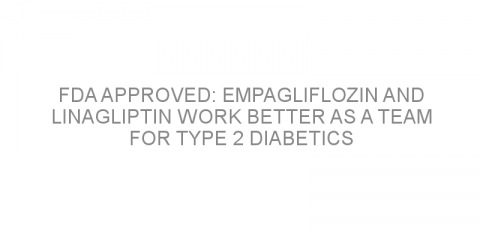In a nutshell This review examined the findings from studies which looked at the connection between low blood glucose levels and brain function. Some background Diabetics who experience hypoglycemia (dangerously low blood sugar levels) may have a higher risk of experiencing dementia. Dementia is a group of brain disorders, including...
Read MoreAnti-diabetes medication(s)-Non-insulin oral drugs Posts on Medivizor
How effective is liraglutide in type 2 diabetic patients?
In a nutshell This study examined the long-term effectiveness of liraglutide in type 2 diabetic patients. Some background Liraglutide (Victoza) is an oral drug used to reduce blood glucose (sugar) levels in patients with type 2 diabetes (T2D). Clinical trials have shown liraglutide to be effective in reducing blood glucose...
Read MoreCanagliflozin – an effective and safe treatment for late type 2 diabetes
In a nutshell This study investigated the effectiveness and safety of canagliflozin (Invokana) as a treatment for late type 2 diabetes. Some background Metformin (Glucophage) is typically the first treatment for type 2 diabetes that cannot be controlled by lifestyle alterations alone. Commonly, additional drugs are eventually...
Read MoreLinagliptin (Tradjenta) – an effective and safe treatment for type 2 diabetics with kidney dysfunction
In a nutshell This study aimed to determine the effectiveness and safety of linagliptin treatment in patients with mild and moderate kidney dysfunction. Some background Approximately 40% of diabetics develop kidney disease. This is associated with a higher risk of developing cardiovascular dysfunction (heart-related illness) and...
Read MoreDo age and oral anti-diabetic medication increase the risk of depression in diabetics?
In a nutshell This study examined whether age and the type of anti-diabetic treatment are associated with a higher risk of depression. Some background Depression is known to be higher in patients with type 1 diabetes and type 2 diabetes. Depression in diabetic patients can result in poorer management of blood glucose levels. Certain factors such...
Read MoreThe effects of canagliflozin on blood glucose levels and blood pressure in type 2 diabetics
In a nutshell This trial investigated the relationship between weight loss, lower blood glucose (sugar) levels and lower blood pressure in type 2 diabetics treated with canagliflozin. Some background Many patients with type 2 diabetes (T2D) are overweight or obese. Losing weight is known to reduce or eliminate diabetes. Most of the current...
Read MoreSaxagliptin has a low risk of hypoglycemia in older type 2 diabetes patients
In a nutshell This study compared the safety and efficacy of saxagliptin (Onglyza) plus metformin (Glucophage) to that of glimepiride (Amaryl) plus metformin in elderly type 2 diabetes patients. Some background Elderly type 2 diabetes patients have a higher risk of hypoglycemia (dangerously low blood...
Read MoreFDA approved: Empagliflozin and linagliptin work better as a team for type 2 diabetics
In a nutshell This study examined whether empagliflozin (Jardiance) plus linagliptin (Tradjenta), along with metformin, was more effective than either treatment alone in patients with uncontrolled type 2 diabetes. Some background Patients with type 2 diabetes either do not make enough of, or are resistant to, insulin. Insulin is the...
Read MoreGlutamine supplementation for blood glucose control
In a nutshell This study examined the use of glutamine and sitagliptin as a treatment for type 2 diabetes mellitus. Some background Glucagon-like peptide-1 (GLP-1) is a hormone that is produced and released following the intake of food. GLP-1 increases insulin production, the hormone responsible for breaking down the glucose (sugar) taken in from...
Read MoreAdding to the treatment toolkit: glimepiride therapy after 10+ years with type 2 diabetes
In a nutshell This study examined the use of the sulphonylurea glimepiride (Amaryl) in patients with long-standing (10 or more years) type 2 diabetes mellitus. Some background Patients with type 2 diabetes mellitus either do not produce enough or are not sensitive to insulin, the hormone which helps the body break down the glucose (sugar) that is...
Read MoreUncontrolled diabetes? Try adding metformin to your acarbose!
In a nutshell The authors aimed to compare the effectiveness and safety of acarbose (Precose) used with or without metformin (Glucophage) in patients with type 2 diabetes. Some background Type 2 diabetes is a long-term progressive disease that occurs due to resistance to insulin which causes high blood glucose...
Read MoreUncontrolled diabetes? Another drug might help!
In a nutshell This study evaluated the effectiveness and safety of adding vildagliptin (Galvus, Zomelis, Jalra) to a metformin (Glucophage) and sulfonylurea (Amaryl, DiaBeta) combination in patients with type 2 diabetes. Some background Type 2 diabetes is a chronic progressive disease that occurs due to resistance to insulin. There are several...
Read More











